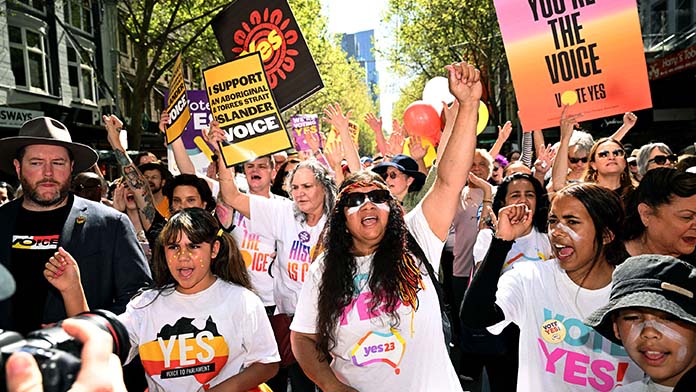The confusion that surrounded the Yes campaign for the Voice to parliament has turned into some despair among the official Yes campaigners in the aftermath of the referendum’s defeat.
Even after taking a week off for “mourning”, all the official Yes campaign could come up with was a commitment to keep pushing for change to Australia’s founding document.
“There is no plan B,” said Voice architect, Noel Pearson. Marcia Langton despondently announced, “Reconciliation is dead.”
The official Yes campaign post-mortem puts most of the blame on the Coalition, declaring, “The lack of political bipartisan support from Nationals leader David Littleproud and Opposition Leader Peter Dutton was a determining factor in the referendum that could not be overcome by the Yes campaign.”
Predictably the racists are trying to take advantage. Tony Abbott has suggested the result, “Should mean abandoning, or at least scaling back … flying the Aboriginal flag … and the routine acknowledgement of country by all speakers at official events.”
The Indigenous face of the No campaign, Jacinta Nampijinpa Price, has tried to launch a new wave of assimilationism by insisting that Indigenous people are not disadvantaged. But her re-energised zealotry is doomed; facts are stubborn things.
The confusion in the aftermath of the vote does not end there. On the one hand, Noel Pearson cited constitutional lawyer Greg Craven who considered the proposal “so modest that no reasonable non-Indigenous person could reject it”. On the other hand fervent Yes campaigner Stan Grant declared, “The Voice was never a modest ask, it was monumental.” Really?
On this question, Pearson is right. The Voice was too modest and its deliberate design with a view to attracting conservative support was the fundamental flaw. While the referendum had majority support among Indigenous people, the fact is that a significant proportion of Indigenous activists voted No.
At the state level, variations of the Voice or Treaty are continuing to be rolled out. In South Australia, Premier Peter Malinauskas says it is full steam ahead with elections planned for March for representatives to the state-based Voice to parliament, the first by any jurisdiction in Australia.
But like the referendum, it would be a mistake to put too much hope in the process. In Queensland, after a little hiccup with the LNP withdrawing their support, Labor Premier Annastasia Palaszczuk has, “confirmed it would release expressions of interest soon, as planned, for two key bodies—a treaty council and a board of inquiry to conduct a truth telling and healing process”.
But Queensland is also the state that suspended its own Human Rights Act in September to pass legislation to allow under-18s, including children as young as ten, to be detained indefinitely in police watch houses.
A federal Voice in the constitution would have been just as powerless. Despite the official Yes campaign’s insistence that “a ‘founding document’ without recognition of First Peoples of this country continues the process of colonisation”, the oppression of Indigenous people is not driven by the constitution.
Distraction
The biggest single consequence of the referendum has been that for the last 18 months, since Albanese declared his commitment to the Voice on the night of Labor’s election, it has served as a distraction from demanding action from the Albanese Labor government.
For Albanese the referendum has been all about the form and nothing about substance.
His response to Labor MPs following the defeat of the referendum is revealing. When he was asked in the parliamentary Labor caucus how the government should respond to the referendum defeat, Albanese said, “We need to continue to do the work which we’ve been doing.”
But while Albanese said that the Voice was about improving outcomes in health, education, jobs and housing, the government has done nothing about any of them.
The High Court has just ruled in favour of compensating NT residents of Ltyentye Apurte (Santa Teresa) following their complaints first made in 2016 about leaking sewage, unstable electricity and a lack of air conditioning. The government housing authority had refused to address them.
On 7 November, Victoria became the second last state (Queensland still hasn’t) to decriminalise public intoxication—one of the recommendations of the Royal Commission into Aboriginal Deaths in Custody from over 30 years ago. Thirty years!
The referendum defeat does not prevent federal Labor from legislating to protect Indigenous land rights from mining companies, or from providing funds to improve Indigenous housing. But Labor was never going to do so without a fight.
The disappointment among the people who campaigned for the Voice is understandable. But it’s no time to despair. It’s the politics of protest that can beat back racism, win Indigenous rights and real social change.
By Ian Rintoul






